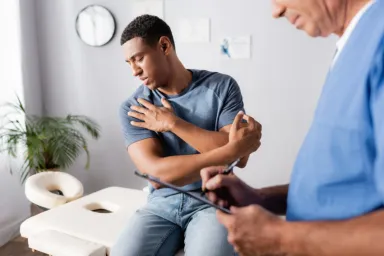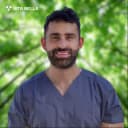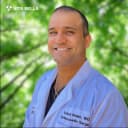Testosterone therapy often carries a cloud of fear and misunderstanding. Many men hesitate to explore treatment because myths about aggression and infertility dominate public perception. Misconceptions prevent people from seeking solutions that could improve energy, mood, and overall well-being.
A report from the National Institutes of Health1 revealed that almost 39 percent of men over age 45 experience low testosterone symptoms such as fatigue, decreased muscle mass, and mood disturbances. Despite these numbers, misinformation continues to discourage men from consulting medical professionals for safe, effective treatment.
Understanding the truth about testosterone and peptide therapy allows men to make informed decisions. This blog addresses the most common myths and demonstrates how medically supervised therapy restores balance, enhances vitality, and preserves fertility without the exaggerated risks often portrayed in the media.
Understanding Testosterone and Peptide Therapy
Testosterone is a hormone critical to men’s physical and emotional health. It influences energy, muscle growth, libido, and mental clarity. Declining levels can lead to fatigue, weight gain, and mood disturbances. Testosterone replacement therapy, or TRT, restores levels to the healthy range, supporting overall function without causing excessive hormone exposure.
Peptides are short chains of amino acids that act as signaling molecules in the body. They regulate tissue repair, metabolism, hormone release, and reproductive function. Some peptides work synergistically with TRT to enhance recovery, promote lean muscle development, and support fertility.
Medical supervision differentiates TRT and peptide therapy from anabolic steroid abuse. Physicians monitor hormone levels, adjust doses, and track patient response. Studies2 confirm that therapy administered correctly improves energy, mood, and quality of life while minimizing side effects.
Myth 1: TRT Will Make You an Aggressive “Roid Rager”
Cultural references and media portrayals have reinforced the idea that testosterone inherently causes aggression. Stories of bodybuilders or professional athletes abusing anabolic steroids dominate headlines. Social media sensationalizes “roid rage” cases, creating fear even among men considering medically supervised TRT.
Many people do not differentiate between supraphysiological steroid use, often combined with other performance-enhancing substances, and clinical testosterone therapy. Steroid abuse involves doses far above natural levels and frequent cycling causing wide swings in hormone levels, which is very different from hormone replacement therapy aimed at restoring normal physiological levels.
The Truth About Aggression and Testosterone
Clinical studies show that restoring testosterone to normal levels often improves emotional regulation rather than promoting aggression. Men3 with low testosterone frequently experience irritability, fatigue, and depression; TRT addresses these imbalances.
A study in the Journal of Clinical Endocrinology and Metabolism4 reported improved mood and reduced anxiety in men receiving TRT. Clinical therapy seeks balance, not excess. Restoring healthy hormone levels allows men to regain emotional stability rather than triggering volatile behavior.
Building Trust Through Evidence
Medical supervision is key to safe TRT. Doctors perform blood tests, adjust doses, and monitor mental health. Psychological assessments can be conducted when needed. Normalizing testosterone improves emotional stability, cognitive function, and confidence.
Research5 also highlights that men with properly managed TRT do not exhibit increased aggression compared with age-matched controls. This evidence helps dispel fears rooted in anecdotal or recreational steroid abuse stories.
Men on properly managed TRT often report feeling more patient, calmer, and more engaged in daily life. TRT restores natural hormone balance rather than changing personality. With monitoring, men can safely experience the benefits of improved energy, strength, and mood without risking “roid rage.”
Myth 2: TRT Causes Infertility
Many men worry that testosterone therapy will permanently shut down fertility. The fear arises because external testosterone can suppress the hypothalamic-pituitary-testicular (HPT) axis, which regulates sperm production. Media coverage often exaggerates the risk, causing unnecessary anxiety.
The Full Picture
The HPT axis works by signaling the testes to produce testosterone and sperm. Exogenous testosterone can temporarily reduce sperm production because the body senses sufficient hormone levels and decreases internal output. Most cases6 are reversible, particularly when fertility-preserving protocols are implemented.
Low testosterone itself can also impair fertility by reducing libido, ejaculate volume, and sperm quality. Restoring normal levels often improves reproductive health alongside other physiological benefits.
Protocols for Preserving Fertility
Human chorionic gonadotropin (HCG) is often administered alongside TRT to stimulate the testes and maintain sperm production. Clomiphene citrate is another option that encourages the body to continue endogenous testosterone synthesis.
Endocrinologists and men’s health specialists tailor treatment plans to individual goals. This allows men to optimize testosterone levels while preserving the ability to conceive. Younger men or those actively planning a family may prioritize fertility-focused regimens before traditional TRT.
Evidence-Based Research
Research in Fertility and Sterility7 demonstrates that men on TRT with HCG can maintain normal sperm counts. Many men have successfully fathered children while on treatment, showing that fertility concerns are manageable with medical guidance.
Long-term studies indicate that men typically recover sperm production within months of therapy adjustments or discontinuation. Fertility preservation during TRT is increasingly standardized in men’s health clinics.
When Caution Is Needed
Full disclosure with your doctor about family planning is essential. Adjusting therapy, starting with peptide therapy, or using fertility-preserving medications ensures reproductive goals remain intact.
TRT can improve quality of life, mood, and physical health without sacrificing fertility. With individualized, medically supervised protocols, men can safely maintain reproductive potential while benefiting from hormone optimization.
The Role of Peptide Therapy Alongside TRT
Peptides work alongside testosterone therapy to support recovery, sleep, metabolism, and fertility indirectly. When used correctly, they help the body heal faster, improve energy levels, and optimize physiological function, enhancing the overall benefits of TRT.
Misconception
Many men believe peptides are “mystery substances” or experimental treatments. In reality, they are naturally occurring chains of amino acids that signal the body to regenerate tissues, regulate hormones, and promote healing, making them safe and scientifically backed when administered under supervision.
Common Peptides
BPC-157 (Body Protection Compound 157): BPC-157 accelerates the healing of muscles, tendons, ligaments, and gut tissue. It reduces inflammation, promotes recovery from injuries, and supports overall physical performance while complementing TRT.
Ipamorelin: Ipamorelin stimulates natural growth hormone release, improving muscle development, metabolism, and recovery. It enhances energy and physical performance without overstimulating the body, making it a safe addition to TRT.
Kisspeptin: Kisspeptin regulates reproductive hormones and supports fertility. It signals the hypothalamus to release gonadotropin-releasing hormone, helping maintain sperm production and reproductive health during testosterone therapy.
Human Chorionic Gonadotropin (hCG) is a peptide hormone that mimics luteinizing hormone (LH) in men. It stimulates the testes to produce testosterone while also supporting sperm production. For men on testosterone replacement therapy, hCG can help maintain fertility and testicular function by preventing testicular shrinkage and preserving natural hormone activity.
When administered under proper medical supervision, peptides enhance the effects of TRT safely. They improve recovery, metabolic function, and overall well-being, especially for men concerned about side effects or fertility during hormone therapy.
Building Trust Through Medical Supervision
Unsupervised hormone therapy carries the highest risk. Recreational use of testosterone or peptides often leads to side effects and reinforces myths about aggression and infertility.
Medical supervision mitigates these risks through tailored dosing, blood monitoring, and regular assessment of cardiovascular health, mood, and fertility. Evidence8 confirms that properly guided therapy improves energy, muscle mass, and emotional well-being while minimizing side effects. Collaboration with healthcare providers ensures each treatment plan aligns with the patient’s body, goals, and lifestyle. Personalized care builds confidence, allowing men to safely benefit from therapies that restore balance, health, and vitality.
Conclusion
Men no longer need to fear testosterone therapy based on myths. Aggression and permanent infertility are rarely a risk when treatment is supervised. Evidence shows that TRT and peptide therapy can restore vitality, mood, and reproductive potential safely.
Vita Bella provides personalized guidance to optimize hormone and peptide therapy. The team ensures every plan matches individual health goals. Take the first step toward renewed energy and balance. Contact us today to experience expert care and achieve your wellness goals.
Frequently Asked Questions
Can Peptide Therapy Boost Energy without Affecting Hormones?
Yes. Specific peptides enhance cellular function, metabolism, and recovery independently of hormone levels. They can improve energy, stamina, and mental clarity without directly altering testosterone or other endocrine pathways.
Are Natural Supplements Enough Compared to Peptide Therapy?
Natural supplements may support overall wellness but often lack targeted effects. Peptide therapy provides precise biochemical signaling, potentially offering faster, measurable results in muscle growth, recovery, and cognitive performance.
Is Testosterone Therapy Safe for Younger Adults?
While generally safe under medical supervision, unnecessary testosterone therapy in younger adults can disrupt natural hormone balance. It’s essential to evaluate risks, benefits, and alternatives before starting treatment.
References
1. National Institutes of Health. Hypogonadism in men. Retrieved from https://www.nih.gov





















